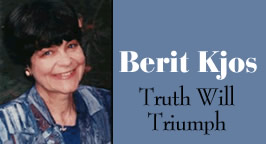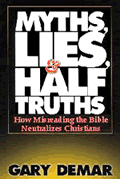Other Kjos Articles:
Harry Potter and The Postmodern Church
Popular Occultism and the Consensus Process
Legalized Mind Control Part 1Harry Potter And The Chamber of Secrets
Part 1
Hegelian Alchemy And
Mind Changing Games
Part 2
Pagan Fantasies Join The Digital Explosion
Part 3
The Global Message Behind Mystical
Thrills
ANNE RICE RE-IMAGINES JESUS & CHRISTIAN LEADERS APPLAUD
By Berit Kjos
February 10, 2006
NewsWithViews.com
Anne Rice, whose occult books "have sold more than 75 million copies,"[1] has returned to Catholicism. She hasn't renounced her Vampire Chronicles or the Broadway-bound play it spawned, but her spiritual journey has changed directions. Her new focus is on Jesus' childhood and God's inclusive family. "Christ is for everyone," she tells us. "...Christian, atheist, Buddhist, Hindu. We are the children of God."[2]
Christian leaders have cheered the first book in the series: Christ the Lord: Out of Egypt. "[A]s thrilled as I was to learn of Ms. Rice�s reconnection with Christ," wrote pollster George Barna. "I opened this book with minimal expectations. I need not have worried." He explains why:
"She created a moving and credible portrait of the young Lord and His family.... It is a simple but powerful tale of the emergence of the Savior as He probes His own humanity and divinity.... This nicely-paced story helps you to connect with the young Master, experiencing life through His senses.... Some scholars and religious leaders will probably demonize this book as 'fabricated history' or 'bad doctrine.'"[3]
But it is "bad doctrine" to present a fictional view of Jesus that clashes with God's revealed Word. When such a revision of His truth guides the imagination, the reader's "experience" may well make fantasy as believable as reality. The fact that evangelical leaders are fast shifting their foundational focus from teaching "doctrine" to humanitarian "deeds" makes Christians all the more vulnerable to deception.
George Barna isn't the only respected evangelical applauding this story about our Lord's childhood. In a World Magazine review, author Gene Edward Veith writes. "She portrays Jesus as a 7-year-old child, but He is more than a child.... [W]hen He yearns to see snow, it snows. When His uncle is sick, the young Jesus heals him.... Out of Egypt can best be appreciated as the work of a skillful writer meditating on the Incarnation...."[4]
Yes, Anne Rice is a skilled writer. And in today's tolerant, fantasy-driven world many more will welcome her stories about a boy named "Jesus." But will it introduce people to the Biblical Jesus or to a heart-warming counterfeit? How do we recognize truth or heresy? Consider these questions:
1. DOES IT MATCH GOD'S WORD?
The Gospels are full of wonderful miracles. So is this fantasy about a seven-year-old Jesus. Yet the Bible tells us that none of His miracles took place until after His baptism � an event confirmed by the Holy Spirit and God's voice. �I saw the Spirit descending from heaven like a dove," said John the Baptist, "and He remained upon Him.� (John 1:32-34)
After this preparation for ministry, Jesus attended a wedding where He did perform His first miracle.The Bible tells us, "This beginning of signs Jesus did in Cana of Galilee, and manifested His glory...." (John 2:5-11).
Here we see God's flawless timing, which is emphasized throughout John's Gospel. When Jesus was prompted to "go into Judea" before the time was ripe, Jesus answered: �My time has not yet come." (John 7:5-8) But when His betrayal neared, He was ready: "Jesus knew that His hour had come." (John 13:3-4) Everything happens according to God's eternal plan!
2. DOES IT MATCH HISTORICAL FACTS?
Was Jesus born in 11BC? That's the date Ms Rice chose for the birth of the heavenly King.[5] Though it's several years earlier than the dates set by credible historians, it fits her story. It makes Jesus seven years old during the journey home from Egypt � old enough to allow us to "experience" events through His eyes.
But let's backtrack. Joseph brought Mary to Bethlehem because he was required to register there as a member of the "house of David." The Roman Emperor Augustus had decreed that "all" in the Roman empire must be registered every 14 years. One such census was ordered in 8 B.C., but historians believe that this census was actually carried out over the next two years and may not have occurred in the land of Israel until around 6 B.C.[6]
After the birth of Jesus, the magi, who had followed the star in search of the newborn King, alerted the hostile King Herod to the prophesied royal birth. Determined to exterminate any threat to his reign, Herod decreed the mass murder of children less than two years old. Meanwhile God warned Joseph to flee with his small family to Egypt. There they stayed until Herod died in 4 B.C. and God told Joseph to return home. Jesus would probably have been between one and three years old, certainly not seven.
In Rice's story, the family settles in Nazareth and the men in the family work as carpenters and stone masons. A year later, when Jesus is eight years old, they travel to Jerusalem to celebrate the Passover. There the boy gives sight to a blind man and seeks a teacher who can answer his nagging questions about his personal identity. For three days Joseph and Mary search for the missing boy. When found, Jesus promised never to cause them such distress again.[7-280-291]
The Biblical account tells us that Jesus was twelve years old when taken to the Passover feast." (Luke 2:46) These differences are important, for God repeatedly forbids additions and alterations. For example, "You shall not add to the word which I command you, nor take from it...." (Deuteronomy 4:2, more)
3. HOW CREDIBLE ARE HER SOURCES OF INFORMATION?
In the "Author's Note" in the back pages of her book, Ms. Rice explains her extensive research:
"Then there were the legends�the Apocrypha�including the tantalizing tales in the Infancy Gospel of Thomas describing a boy Jesus who could strike a child dead, bring another to life, turn clay birds into living creatures, and perform other miracles. I�d stumbled on them very early in my research, in multiple editions.... I couldn�t get these legends out of my mind. Ultimately I chose to embrace this material.... I felt there was a deep truth in it...."[7-320]
One source of those "legends" is The Gnostic Society. You can read parts of it in "The Infancy Gospel of Thomas." Notice how its "Jesus" distorts the character of our Lord:
"...having made soft clay, [Jesus] fashioned thereof twelve sparrows.... Jesus... said to them: Go! and the sparrows took their flight.... After that... and a child ran and dashed against his shoulder. And Jesus was provoked and said unto him: Thou shalt not finish thy course.... And the parents of him that was dead came unto Joseph, and blamed him, saying: Thou that hast such a child canst not dwell with us in the village: or do thou teach him to bless and not to curse: for he slayeth our children.... Joseph called the young child apart and admonished him.... But Jesus said: I know that these thy words are not thine: nevertheless for thy sake I will hold my peace: but they shall bear their punishment. And straightway they that accused him were smitten with blindness."[8]
Ms Rice seems to trust human philosophies more than the Bible. She lists dozens of authors whose views she has studied in preparation for this book series on the early life of Jesus. "I learned something from every single book I examined," she writes.[7-318]
Even from those that taught a Gnostic distortion of the Gospels? You can recognize this heresy by its emphasis on:
1. Self-knowledge and self-actualization rather than knowing God and His Word.
2. Eternal oneness or wholeness through gnosis � secret knowledge, not salvation through the crucified Savior.
3. Angelic hierarchies including archons, demigods, co-creators, which turn God's truth upside down. In this context, the serpent in the garden offered wisdom � "your eyes will be opened, and you will be like God� (Genesis 3:5) � not a disastrous temptation.
Anne Rice shows special appreciation for Anglican Bishop John A. T. Robinson. I read his book, Honest to God, decades ago. This discouraging book told me that the God I had loved as a child was an illusion. Though Anne Rice may not have agreed with all he wrote, these two quotes expose the worldly "wisdom" he might have brought to her research:
"Robinson places God deep in the human person (so that we have to look within to find God)..... Whenever we pray we are not speaking words into the heavens... but are allowing our prayers to change us ."[9]
"Honest to God was a product of its time: traditions were questioned, orthodoxy was challenged and norms of behavior disregarded. ... This ['Death of God'] movement sought to reinterpret fundamental Christian doctrines.... As for the notion of heaven, he believed it was the 'greatest obstacle to an intelligent faith - and indeed will progressively be so to all except the religious few.' Whenever we acted ethically, lovingly and compassionately towards another, according to Robinson, we were reaching towards God and embracing eternal values."[10]
Anne Rice seems to share that view. "...all humans are his children and it is His desire to bring them all home.... My particular ministry... is to stress love... and tolerance, an awareness of the sacred quality of every human, whether that human is a Jew, a Moslem, a gay Christian, a secular materialist who is striving to make the quality of life better for the poor. My ministry is not to divide over points of 'doctrine' or theological nuances."[2]
A. T. Robinson is only one of many strange advisors listed in Anne Rice's "Author's Note." Her "quest is not over," she tells us. "There are thousands of pages of the above-mentioned scholars to be read and reread..... There are also theologians who must be studied, more of Teilhard de Chardin, and Rahner...."[7-319]
Teilhard de Chardin? The 19th century French paleontologist whose faith in man's spiritual evolution led, in part, to the fraudulent "discoveries" of Peking man and Piltdown Man? Recalling his book The Phenomenon of Man, I can't help but compare Teilhard's tension between cosmic oneness and self-actualization with the Gnostic emphasis on union with "God" through self-realization:
"The way beyond the ignorance [to knowing or gnosis], for Teilhard, is basically an individuation process. Teilhard opines that the human ego must make the pilgrimage into *Self.* ... The more the ego is connected with a sense of cosmic insight, the more it finds its true Self.... and via the Self the more connected humanity becomes with the Cosmic Mind. ... There is no mind without synthesis."[11]
This emphasis on self-knowledge and unity fits right into the systems thinking embraced by today's leading church managers.[12] [See Rick Warren � A New Way of Thinking]
4. WILL IT STRENGTHEN OR UNDERMINE FAITH IN GOD'S UNCHANGING TRUTH?
Ms. Rice has made storytelling a popular pastime in Jesus' family. She places her own attitude toward storytelling in the young Jesus' mouth: "Stories were our history, and who we were, and there were times when I liked nothing better than stories. I was coming to understand something of the greatest importance: all stories were part of one great story, the story of who we were."[7-228]
But it isn't true. All stories are not part of the one great story. In fact, very few of man's stories are part of the truth revealed to us by God. Therefore He wisely warns us, "My thoughts are not your thoughts, nor are your ways My ways." (Isaiah 55:8) Do we dare redefine God's thoughts, truth, and ways?
|
Subscribe to the NewsWithViews Daily News Alerts! |
Anne Rice's Christ the Lord is likely to speed today's social and spiritual transformation. So are "change" leaders like George Barna and Rick Warren, who minimize Biblical teaching. As Warren said, "The first Reformation was about beliefs. This one needs to be about behavior."[15] The church is now leading the race toward a global society with tolerance for everything except God's "divisive" and "offensive" old Gospel. It's message of hope is being silenced by the seductive illusion of humanist love, communitarian service, and global solidarity.
Footnotes:
1,
Interview
With Penitent
2,
Cadmusings
3,
Christ
the Lord: Out of Egypt
4,
Trading Spaces
5,
The Gospel
According to Anne
6,
John MacArthur, ed., The MacArthur Study Bible (Nashville: Word, 1997),
page 1514.
7,
Anne Rice, Christ the Lord: Out of Egypt (New York: Alfred A. Knopf,
2005).
8,
The Infancy Gospel of Thomas From "The
Apocryphal New Testament
9,
Anglican Media Melbourne
10,
The Death
of God: An Introduction
11,
Teilhard's
Gnosis: Cosmogenesis
12,
40 days
of change through a new way of thinking and Reinventing
the world
Sign Up For Free E-Mail Alerts
E-Mails are used strictly for NWVs alerts, not for sale
Berit Kjos is a widely respected researcher, writer and conference speaker. A frequent guest on national radio and television programs, Kjos has been interviewed on Point of View (Marlin Maddoux), The 700 Club, Bible Answer Man, Beverly LaHaye Live, Crosstalk and Family Radio Network. She has also been a guest on "Talk Back Live" (CNN) and other secular radio and TV networks. Her last two books are A Twist of Faith and Brave New Schools. Kjos Ministries Web Site: http://www.crossroad.to/index.html
But it is "bad doctrine" to present a fictional view of Jesus that clashes with God's revealed Word. When such a revision of His truth guides the imagination, the reader's "experience" may well make fantasy as believable as reality.











